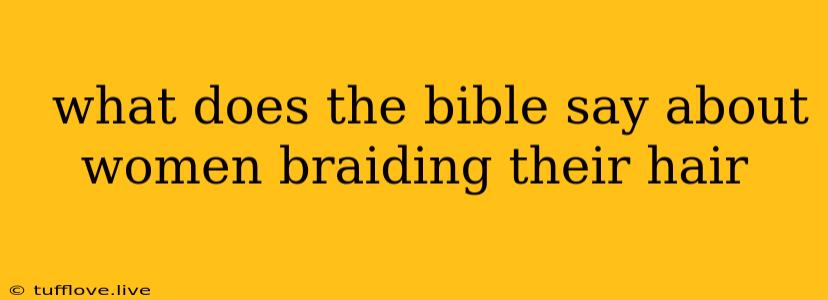The Bible, a collection of sacred texts revered by Christians and Jews, offers guidance on various aspects of life, including personal appearance. One question that has sparked discussion and interpretation within these faith communities concerns the practice of women braiding their hair. While the Bible does not explicitly condemn or endorse braiding, certain passages provide insights into the cultural context of hairstyles and the broader principles of modesty and adornment. This exploration will delve into relevant biblical passages and their interpretations to shed light on what the Bible says about women braiding their hair.
The Significance of Hair in Biblical Context
Throughout Scripture, hair holds symbolic significance. It can represent strength, beauty, and even spiritual power. In the Old Testament, Samson's strength was tied to his long hair, signifying his connection to divine power. The Book of Leviticus prohibits men from shaving their heads as a sign of mourning, emphasizing hair's role in expressing grief and connecting with God.
The Emphasis on Modesty and Adornment
The New Testament, particularly the Pauline epistles, offers guidance on women's attire and adornment. Passages like 1 Timothy 2:9 and 1 Peter 3:3-4 emphasize the importance of modesty and simplicity in dress. These verses encourage women to focus on inner beauty and spiritual qualities rather than relying on outward appearances to attract attention.
Interpretations and Diverse Perspectives
The interpretation of these passages regarding hairstyles, including braiding, has varied across different Christian denominations and historical periods. Some see the emphasis on modesty as a restriction on elaborate hairstyles, including braiding, while others view it as a call for moderation and avoidance of vanity.
Cultural Context and Historical Practices
It's crucial to consider the cultural context of the biblical texts. In the ancient world, hairstyles often served as markers of social status, religious affiliation, and even marital status. Women might braid their hair as a sign of cultural identity or personal expression.
Contemporary Applications
In contemporary times, the practice of braiding hair continues to hold cultural and personal significance. Women from various backgrounds and ethnicities embrace braiding as a form of self-expression, cultural heritage, and beauty enhancement.
A Balanced Perspective
While the Bible does not explicitly address the act of braiding, the principles of modesty and avoiding vanity offer valuable insights for Christians seeking guidance on personal appearance. It's important to approach these passages with a balanced perspective, recognizing the cultural context and considering personal convictions.
Ultimately, the decision of whether or not to braid one's hair is a personal one, influenced by cultural norms, personal preferences, and individual faith interpretations. The Bible provides a framework for navigating this choice, encouraging women to prioritize inner beauty and avoid excessive adornment that might distract from their true identity.
Conclusion
The Bible doesn't offer a definitive answer on whether or not women can braid their hair. The emphasis on modesty and simplicity in dress, coupled with the cultural context of hairstyles, suggests that the focus should be on inner beauty and spiritual qualities rather than outward appearances. While braiding can be a form of self-expression and cultural heritage, the decision should be informed by personal conviction and a balanced perspective on the biblical teachings.
